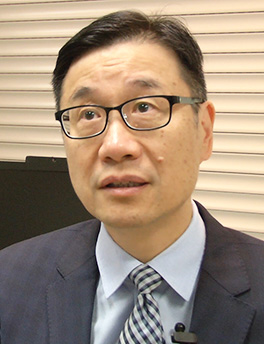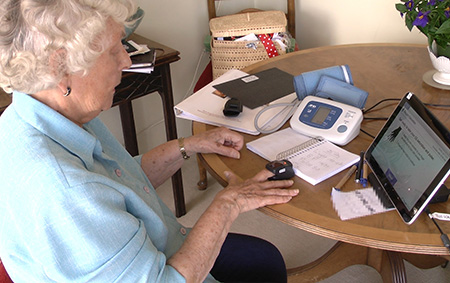The diagnostic devices arrayed on Joy Gaze’s dining table might appear to be just that – an inanimate collection of sensors and circuitry, incapable of providing comfort and care.
To Gaze, however, those devices became her “guardian angel.”
In the weeks after she experienced a heart attack, Gaze, 91, used the devices to monitor – and to enable a nurse to monitor – her weight, blood pressure, blood-oxygen levels and heart rate. She also used a special tablet to answer questions about how she was feeling each day – valuable information that, like the numbers from the devices, was funneled to the nurse.
Thanks to that flow of information, it soon became clear that Gaze needed a higher dose of her diuretic in order to ease the strain on her weakened heart. After that adjustment, her blood pressure stabilized, and she steadily recovered.
The suite of devices and its accompanying software, part of a project called TEC4Home, are part of a clinical trial – the largest ever of its kind in Canada – aimed at preventing people with chronic heart failure and chronic obstructive pulmonary disease (COPD) from a rushed return to the emergency department.
Liberating people from their disease
It’s a distressingly consistent pattern: One in four people with chronic heart failure are re-admitted to hospital within one month of being discharged from their initial stay, and four in 10 are re-admitted within three months.
“As an emergency doctor, I see how emergency departments become a bit of a revolving door for people with heart disease and COPD,” says Kendall Ho, a Professor in the UBC Department of Emergency Medicine and leader of TEC4Home.
The threat of having to take another ambulance ride often makes people with heart and lung disease a prisoner of their condition – afraid to leave their homes, lest they find themselves too far from immediate help.
“When I got back from hospital the last time, I was quite scared of going out – me, who has never been scared of anything,” says Gaze, who was a nurse to British troops in World War II.
A technician bearing devices
TEC4Home, which stands for “Telehealth for Emergency-Community Continuity of Care Connectivity via Home-Telemonitoring,” is the largest-ever test in Canada of the efficacy of tele-health for lowering the rate of hospital re-admission.
Within three days of being discharged from the hospital for an initial heart failure-related event, participants are visited by a technician from TELUS, who comes bearing several devices: a dedicated router; a digital scale that is wired to the router; a blood pressure cuff and machine that transmits wirelessly; a finger clip that reads blood-oxygen levels and heart rate, also transmitted wirelessly; and a tablet that guides the participant through each step, and asks a few questions.
Every day for eight weeks, participants take their readings and answer the questions shortly after waking up. Dianne Ross, a cardiac nurse, logs on each day from Vancouver General Hospital to see how each person is faring.
“The system actually prioritizes the alerts that are coming in from my patients, so I can look and actually see, ‘Oh, Mrs. Smith has five alerts today,’” Ross says.
Encouraging results
The first phase of the trial involved 70 heart failure patients in Vancouver or Kelowna, and though it was mostly aimed at determining feasibility and safety, the results have been encouraging. Dr. Ho and his collaborators are preparing a manuscript for publication in a peer-reviewed journal about those results, but says they have already identified seven cases in which hospitalization was avoided thanks mainly to the intervention.
In one case, the monitoring detected low blood pressure, indicating that the person was experiencing an irregular heart rhythm. The person’s blood pressure medication was adjusted, thus preventing a fairly likely scenario: fainting, followed by a trip to the nearest emergency department.
“We are hoping to generate much-needed evidence indicating whether such devices and strategies can make a substantial difference in the health outcomes of people with heart and lung conditions,” Dr. Ho says. “A key metric will be comparing hospital return rates for people who are using TEC4Home, compared to a control group of patients who aren’t using it.”
To date, the team has received $4.5 million from the Canadian Institutes of Health Research, the Michael Smith Foundation for Health Research, and the B.C. Ministry of Health to expand the trial to encompass 22 communities throughout British Columbia.
With support from Vancouver Coastal Health, Interior Health and Fraser Health, they hope to recruit 900 patients over 18 months – half of them using the TEC4Home monitoring, the other half serving as a control group, receiving no tele-health intervention. TELUS will continue to provide technical support, in the form of equipment, technical support to participants, and overall project management.
In addition, the team obtained funding support from Canada Health Infoway and the B.C. Ministry of Health to support people with chronic obstructive pulmonary disease (COPD) in Vancouver and Kelowna.
Engaging people in their health
The premise of TEC4Home is more than just showing the efficacy of remote monitoring by a health professional. It’s also about getting people to keep tabs on themselves.
The very act of taking their readings and answering questions about how they’re feeling each day might help them recognize changes in their symptoms, and thus be more inclined to seek help before things suddenly take a bad turn. It will also help them have more productive conversations with health professionals.
“It’s a bit onerous to remember to get up and go stand on the scale, and do it all,” Gaze says. “But in other ways, it’s exciting, because I’m watching my weight come down – hooray! – and taking my blood pressure each day, which is steadying.”
But there is also no doubting the peace of mind that comes from knowing that a health professional is tracking them on a daily basis.
“I’ve been three times to the theatre since all this started, and I’m going again on Sunday, so I am living proof that this works,” Gaze says. “Somebody else is looking after me – it’s like a guardian angel!”

